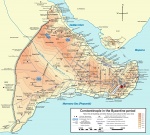Difference between revisions of "Phanar"
(initial entry) |
m (ro) |
||
| (3 intermediate revisions by 3 users not shown) | |||
| Line 1: | Line 1: | ||
| − | '''Phanar''', | + | '''Phanar''', '''Fener''', or '''Fanar''' (Greek Φανάρι [fa'nari]) is a neighborhood midway up the Golden Horn, within the borough of Fatih, in Istanbul, Turkey (formerly Constantinople). The streets in the area are full of historic wooden houses, [[church]]es, and [[synagogue]]s dating from Byzantine and Ottoman times. The name ''phanar'' comes from Greek "fanari" (φανάρι), meaning ''lantern''. During the city's Byzantine period there was within the district a columnar monument topped with a lantern. |
After the fall of Constantinople on [[May 29]], 1453, the Phanar district became the home to most of the Greeks who remained in the city. The Greek inhabitants of Phanar were called Phanariotes. In 1599, the [[Ecumenical Patriarchate]] moved to the area as well and is still located in the Phanar. As a result, ''Phanar'' is often used as shorthand for the Ecumenical Patriarchate just as ''Vatican'' is used for the leadership of the [[Roman Catholic]] Church. | After the fall of Constantinople on [[May 29]], 1453, the Phanar district became the home to most of the Greeks who remained in the city. The Greek inhabitants of Phanar were called Phanariotes. In 1599, the [[Ecumenical Patriarchate]] moved to the area as well and is still located in the Phanar. As a result, ''Phanar'' is often used as shorthand for the Ecumenical Patriarchate just as ''Vatican'' is used for the leadership of the [[Roman Catholic]] Church. | ||
| + | [[Image:Byzantine-Constantinople.jpg|right|thumb|150px|Old Constantinople]] | ||
| + | Under Ottoman rule the Ecumenical Patriarch was made responsible, as the Ethnarch, for all Orthodox people within the Ottoman state, undertaking all administrative and juridical responsibilities in civil cases concerning Orthodox Christians. Thus, the Phanar was the center of Orthodox Christian culture under the Ottomans. The seat of the Ecumenical Patriarch is the [[Cathedral Church of St George (Istanbul)|Cathedral of St George]], which is located in the Phanar. | ||
| − | + | The Phanar Greek Orthodox College, which was founded in 1454, is now located near the Cathedral of St George. In the sixteenth century, a Greek school, the ''Great School of the Nation'', was established. It continues today in Phanar as a middle and high school for the ethnic Greek inhabitants of Constantinople. | |
| − | + | == See also == | |
| + | *[[District of the Phanar and the Keratius gulf]] - [[Church of Constantinople]] | ||
==External link== | ==External link== | ||
| Line 11: | Line 14: | ||
[[Category: Places]] | [[Category: Places]] | ||
| + | |||
| + | [[ro:Fanar]] | ||
Latest revision as of 15:50, November 18, 2012
Phanar, Fener, or Fanar (Greek Φανάρι [fa'nari]) is a neighborhood midway up the Golden Horn, within the borough of Fatih, in Istanbul, Turkey (formerly Constantinople). The streets in the area are full of historic wooden houses, churches, and synagogues dating from Byzantine and Ottoman times. The name phanar comes from Greek "fanari" (φανάρι), meaning lantern. During the city's Byzantine period there was within the district a columnar monument topped with a lantern.
After the fall of Constantinople on May 29, 1453, the Phanar district became the home to most of the Greeks who remained in the city. The Greek inhabitants of Phanar were called Phanariotes. In 1599, the Ecumenical Patriarchate moved to the area as well and is still located in the Phanar. As a result, Phanar is often used as shorthand for the Ecumenical Patriarchate just as Vatican is used for the leadership of the Roman Catholic Church.
Under Ottoman rule the Ecumenical Patriarch was made responsible, as the Ethnarch, for all Orthodox people within the Ottoman state, undertaking all administrative and juridical responsibilities in civil cases concerning Orthodox Christians. Thus, the Phanar was the center of Orthodox Christian culture under the Ottomans. The seat of the Ecumenical Patriarch is the Cathedral of St George, which is located in the Phanar.
The Phanar Greek Orthodox College, which was founded in 1454, is now located near the Cathedral of St George. In the sixteenth century, a Greek school, the Great School of the Nation, was established. It continues today in Phanar as a middle and high school for the ethnic Greek inhabitants of Constantinople.
